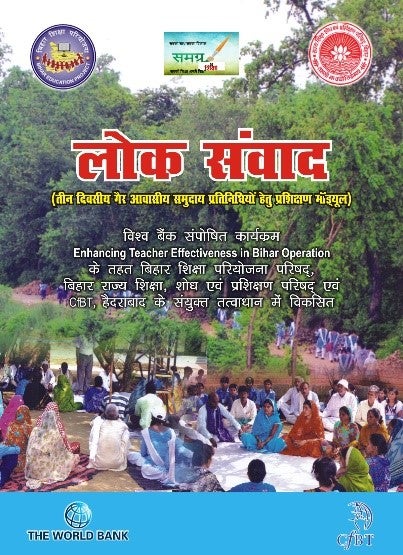 A VSS training program in rural Bihar
A VSS training program in rural Bihar
Mr. Mithilesh Paswan is beaming with confidence as he pulls out his low-budget smartphone and excitedly shows the mobile application he and his friends have been using since a few months – the “Bihar School Score Card Application (SSCA)”. Mr. Paswan is the chairperson of Vidyalaya Shiksha Samiti (VSS), or the school management committee of Middle School Araria Sangram in the district of Madhubani, located about 200 km from Bihar state’s capital Patna. As the chairperson, he oversees the work of this 17-member VSS, a committee constituted by parents (with mothers occupying more than half the slots), teachers, students, self-help group representatives, and a representative from institution of local governance (Panchayati Raj Institution). The committee at Middle School Araria Sangram represents a larger effort by the government to empower community groups in Bihar to monitor, report on, and claim their rights of access to quality basic education.
Using the application, members of the VSS in Middle School Araria Sangram now have a user-friendly instrument to assess school performance by collecting and analyzing data. Consisting of 22 simple observations designed to be fed into an Android application using traffic light symbols (green for very good, amber for satisfactory, red for needs-improvement), the school score card provides an easy way for the community members to track various dimensions of school quality. These include student and teacher attendance, simple observations on classroom transactions and student performance, and provision of basic infrastructure such as drinking water, toilets, and mid-day meals. Each observation’s description is also represented as an image in the application, enabling even illiterate or semi-literate VSS members to enter observations in the form of traffic lights. At least two members collect observations each month, and the data is discussed in monthly meetings of the VSS. Consolidated records with real-time trend analytics generated from the application are also made available to authorized users at the Block and District levels for monitoring and policy decisions. The effort is part of the larger World Bank supported Enhancing Teacher Effectiveness in Bihar Operation that includes improvements in accountability mechanisms at the school level as one of its objectives.
In India, VSS concept has evolved over the past three decades. It was strengthened under the Right to Education (RTE) Act 2009 that mandated the constitution of school management committees in every government-funded school in India. The responsibilities of these committees were laid out as monitoring the working of schools, preparing and recommending school development plans, monitoring the utilization of grants received from various sources, monitor teachers’ and students’ attendance, monitoring mid-day meal, etc. The RTE Act envisioned parents to get involved as decision-makers with an objective to make teachers and principals more accountable for education delivery which in-turn would lead towards better learning outcomes of students.
International evidence suggests that such community-based accountability interventions and social audit can lead to improved service provision and intermediary outcomes such as increased community voice and ownership, participation levels and service provider responsiveness.
The experience from Bihar suggests that first-generation technology-based innovations such as the SSCA can benefit from complementary interventions on capacity building of communities. The State Council of Educational Research and Training (SCERT) in Bihar is investing in a training-program to sensitize VSS members across Bihar’s more than 75,000 elementary schools. A training module called ‘Lok Samvad’ (Hindi phrase for ‘People’s Dialogue’), and related materials for the school management committees customized to their specific contexts has been developed, together with a delivery model contextualized to the specific challenges in Bihar. A pool of master trainers (two from each of the 38 districts) has also been created for the dissemination of the training content to the school level trainers and to support the trainers with any queries on content and methodology of the training program. The training program itself has been designed to focus on practicing skills required for measuring quality education. The central theme of the training program for the VSS is on improving teacher attendance, accountability and effectiveness.

School Scorecard Application Screenshots
Several challenges still remain in fully utilizing the potential of community participation in improving school accountability. There are difficulties in addressing different levels of literacy of the community for the design of materials. In several parts of the state, community members with no formal education have huge difficulties in assessing the effectiveness of teachers despite attending training programs. Sometimes, there also exist a power imbalance between the community members and the school principals, inhibiting joint resolution of school quality issues. Similarly, in poor rural areas, the local elite may close the spaces for wider community representation and participation in school management committees. The use of SSCA itself is challenging in some parts of the state due to hardware issues or lack of mobile network.
Despite these challenges, change-makers such as Mr. Paswan are optimistic. The Vidyalaya Shiksha Samitis have offered a vehicle to effectively engage with the school system, and availability of data on simple metrics such as teacher attendance has been helpful in establishing the accountability of teachers at the very least. “Bihar is the land of wisdom, of Buddha, of Nalanda and Vikramshila Universities. If we would not transform the face of education in India, who will?” Mr. Paswan adds emphatically.
(Kumar Vivek and Shabnam Sinha are Task Team Leaders of the Enhancing Teachers Effectiveness in Bihar Operation. Kamal Nath Jha, an employee of IPE Global Ltd., works with the SCERT in Bihar.)





Join the Conversation